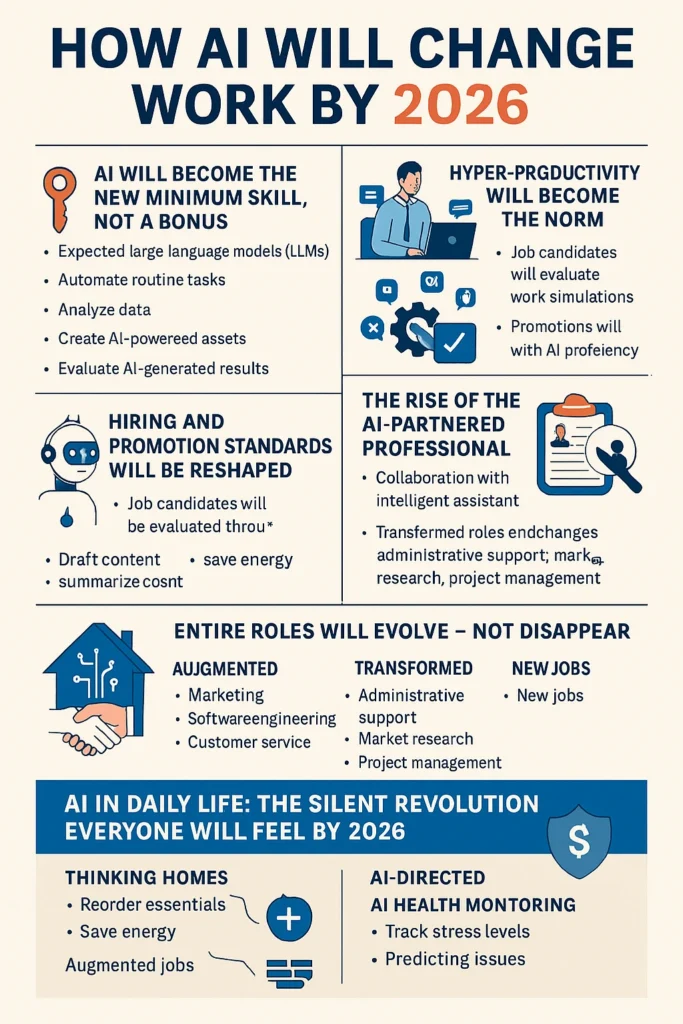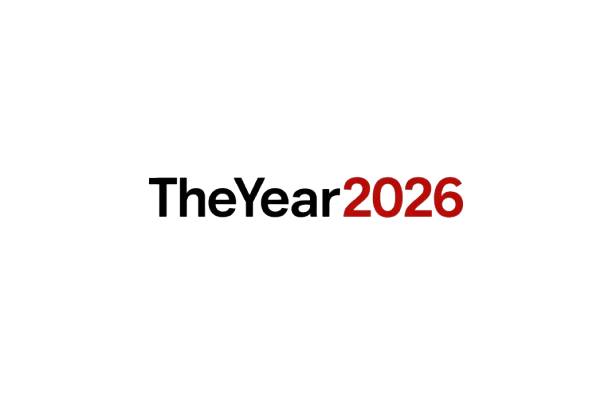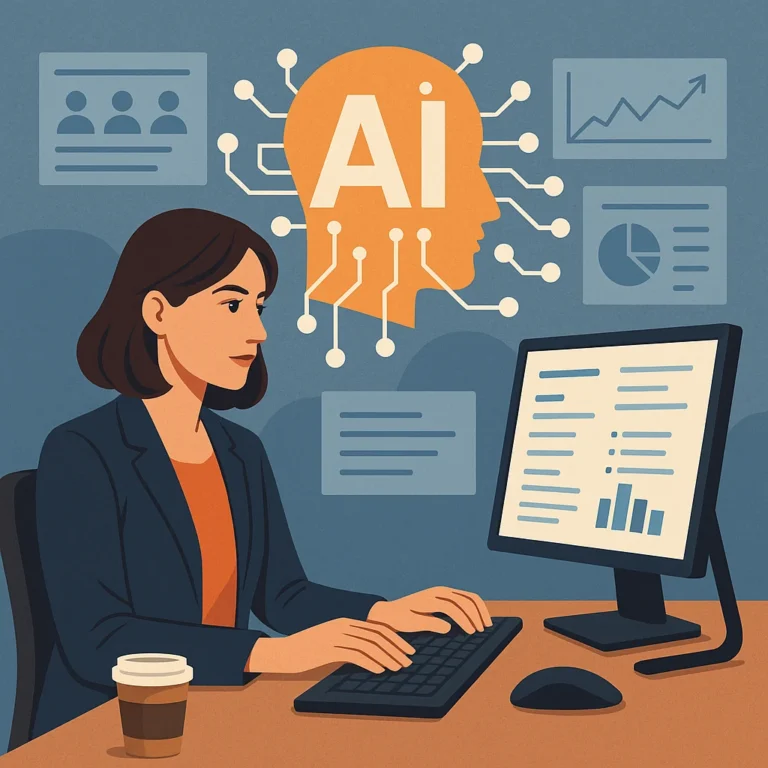Artificial intelligence is no longer a distant future it’s the electrical wiring of the next economy. By 2026, AI will not simply “assist” work; it will quietly reshape entire workflows, rewrite job expectations, and introduce new professional standards across industries.
The change won’t look like robots replacing people. It’ll look like a workplace where every professional who knows how to use AI will outperform ten who don’t.
Below is a deep, realistic breakdown of how AI will transform work by 2026 plus a dedicated section on AI in daily life, where the biggest shifts will be felt first.
AI Will Become the New Minimum Skill, Not a Bonus
By 2026, “AI literacy” will be as essential as Excel proficiency was in the early 2010s.
Professionals will be expected to:
- Prompt large language models (LLMs) effectively
- Automate routine tasks
- Analyze data using AI tools
- Create AI-powered reports, summaries, or prototypes
- Understand how to evaluate AI-generated results
Job descriptions will quietly shift from “AI experience preferred” to “AI experience required.”
In most industries, individuals who resist AI will not lose their jobs but they will struggle to justify their productivity compared to augmented coworkers.
Hyper-Productivity Will Become the Norm
AI is already turning one person into a small team. By 2026:
- A marketer will generate a month’s content in an afternoon.
- A developer will build prototypes in hours instead of weeks.
- A customer support representative will handle 5× more queries using AI-aided responses.
- A small business owner will automate tasks that normally require multiple employees.
The people who thrive won’t be the ones who work harder, they’ll be the ones who orchestrate AI systems intelligently.
This shift will pressure organizations to measure output differently. Instead of valuing hours worked, companies will value results, speed, and the creative use of AI tools.
AI Will Reshape Hiring and Promotion Standards
HR teams are already testing AI for everything from résumé screening to skill evaluation. By 2026:
- Job applicants will face AI-powered work simulations instead of traditional interviews.
- Promotions will be tied to AI proficiency, not just tenure.
- Skill-based hiring will rise dramatically as AI evaluates capabilities rather than credentials.
- Candidates will be rated on how well they collaborate with AI tools.
Companies won’t just ask, “Can you do this job?”
They’ll ask, “Can you do this job faster, smarter, and more accurately with AI?”
The Rise of the AI-Partnered Professional
The workplace will be less about “using tools” and more about collaborating with an intelligent assistant that:
- Predicts what you need before you ask
- Summarizes meetings you forgot to attend
- Builds first drafts of everything
- Flags mistakes before humans notice
- Keeps you updated on workflow changes
- Suggests smarter ways to work
- Watches your performance patterns and recommends improvements
Think of it as a personal Chief of Staff in your pocket.
By 2026, professionals who fully integrate AI into their routines will operate at a level that once required multiple human assistants.
Entire Roles Will Evolve, Not Disappear
AI will not eliminate most jobs by 2026, but it will reshape almost all of them. Here’s what this evolution looks like:
Jobs that will be augmented heavily
- Marketing and content creation
- Software engineering
- Customer service
- Finance and accounting
- Data analysis
- Real estate
- Healthcare administration
- Design and creative work
Professionals in these fields will work with AI, not in competition with it.
Jobs that will transform completely
- Administrative support
- Market research
- Project management
- Logistics coordination
- Technical documentation
These roles will shift from manual execution to AI oversight, curation, quality assurance, and strategic decision-making.
New jobs that will emerge
- AI workflow designers
- Data validation specialists
- Prompt engineers (more niche than today, but still relevant)
- AI compliance officers
- Synthetic content auditors
- Human–AI collaboration coaches
AI won’t delete opportunity. It will redraw it.

AI in Daily Life
Before AI reshapes workplaces, it will reshape daily routines. By 2026, AI will become as normal as Wi-Fi.
Smart Homes Will Become “Thinking Homes”
AI won’t just follow commands it will anticipate them:
- Turning off unused appliances automatically
- Suggesting energy-saving routines personalized to your habits
- Reordering household essentials before they run out
- Detecting maintenance issues before they become expensive repairs
Your home will understand your patterns better than most people do.
Personal Finance Will Become AI-Directed
AI assistants will help individuals:
- Build personalized budgets
- Detect fraud faster
- Predict financial risks
- Automate savings
- Evaluate investment options based on user goals
Instead of people Googling financial advice, AI will deliver answers tailored to their exact income, spending patterns, and long-term plans.
Health Will Shift Toward Preventive AI Monitoring
Smart devices paired with AI will:
- Track stress levels
- Predict early signs of health issues
- Provide nutrition and exercise recommendations
- Monitor sleep patterns and adjust routines
- Alert users to changes that may require medical attention
AI won’t replace doctors, but it will help people reach them sooner.
AI Will Be Embedded in Every Digital Service
By 2026:
- Your email inbox will auto-sort, summarize, and respond to routine messages.
- Travel apps will automatically suggest better itineraries at lower costs.
- Learning platforms will generate personalized study experiences.
- Browsers will summarize long web pages and highlight what matters.
- Entertainment will be tailored to mood, time, and interests.
The line between “app” and “assistant” will blur completely.
Workers Will Need a New Personal Strategy for the AI Era
The smartest thing professionals can do between now and 2026 is simple:
Learn to collaborate with AI, not compete with it.
Three practical shifts will matter most:
- Mindset shift: Curiosity over fear.
- Skill shift: AI literacy becomes a core career skill.
- Workflow shift: Automate routine tasks and focus on higher-value strategic work.
Those who adapt will elevate their economic value dramatically.
The Biggest Mistake Workers Will Make Before 2026
Many people will assume AI isn’t a threat because their industry feels “human-centered.”
But AI is not replacing human connection it’s replacing inefficiency.
The real risk is not losing a job to AI.
The real risk is losing a job to a person who knows how to use AI better.
What Success Looks Like in an AI-Driven 2026
Professionals who thrive will have:
- A personal AI system integrated into daily work
- A habit of continuous learning
- Speed, adaptability, and strategic thinking
- A comfort level with tools that automate repetitive tasks
- A portfolio of AI-driven results they can show employers or clients
The world will reward people who can think critically, collaborate creatively, and use AI as leverage.
The Future Is Not Scary It’s Expandable
If 2023–2024 was about discovering AI,
then 2025–2026 will be about deploying it.
The workplace of 2026 will not be a place where humans compete with machines. It will be a place where humans who embrace machines become the most effective version of themselves.
The opportunity is massive and still wide open for anyone willing to adapt today.

